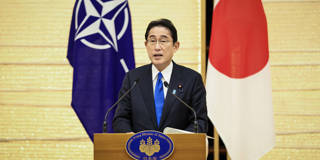As the only country that has experienced the hellish consequences of a nuclear attack, Japan has a unique responsibility to fight for the elimination of nuclear weapons. But that does not mean it should not be able to protect itself – an effort that, as Ukraine’s plight shows, all but demands a nuclear deterrent.
NEW HAVEN – World War II transformed the world, but nowhere more than Japan. The only country in the world to have suffered the devastation of nuclear bombs, Japan rejected the militarism that had defined its politics for decades. In 1947, it adopted a pacifist constitution, drafted largely by Americans, which formally renounced war as the right of a sovereign nation and the threat or use of force as a means of resolving disputes. Needless to say, Japan would not be seeking to become a nuclear power.
But while the world changed profoundly in the ensuing decades, Japan’s security policy largely did not. Japan’s security remained the responsibility of the United States, which had pledged to defend the country in the event of armed attack. Accordingly, the US maintained a significant troop presence and several bases in Japan, and extended its nuclear umbrella to the country.
Even this was too much militarism for many Japanese, who remained overwhelmingly committed to pacifism and, in many cases, opposed the presence of US bases on Japanese soil. When Prime Minister Nobusuke Kishi sought in 1960 to increase Japan’s role in its own defense, student protests erupted. Even I – not generally an activist during my time at university – participated in the demonstrations. In later years, moreover, I wrote the occasional commentary applying game-theoretic thinking to make the case for pacifism during the Cold War – making me one of many voices in the media touting such an approach.

NEW HAVEN – World War II transformed the world, but nowhere more than Japan. The only country in the world to have suffered the devastation of nuclear bombs, Japan rejected the militarism that had defined its politics for decades. In 1947, it adopted a pacifist constitution, drafted largely by Americans, which formally renounced war as the right of a sovereign nation and the threat or use of force as a means of resolving disputes. Needless to say, Japan would not be seeking to become a nuclear power.
But while the world changed profoundly in the ensuing decades, Japan’s security policy largely did not. Japan’s security remained the responsibility of the United States, which had pledged to defend the country in the event of armed attack. Accordingly, the US maintained a significant troop presence and several bases in Japan, and extended its nuclear umbrella to the country.
Even this was too much militarism for many Japanese, who remained overwhelmingly committed to pacifism and, in many cases, opposed the presence of US bases on Japanese soil. When Prime Minister Nobusuke Kishi sought in 1960 to increase Japan’s role in its own defense, student protests erupted. Even I – not generally an activist during my time at university – participated in the demonstrations. In later years, moreover, I wrote the occasional commentary applying game-theoretic thinking to make the case for pacifism during the Cold War – making me one of many voices in the media touting such an approach.